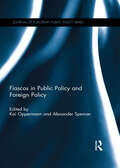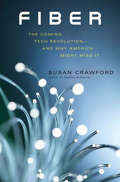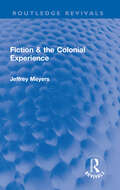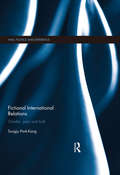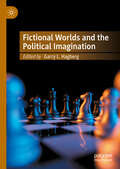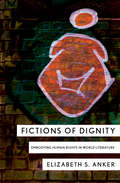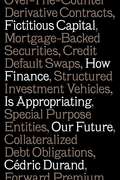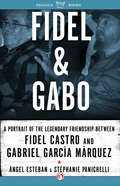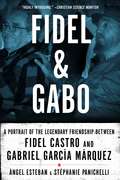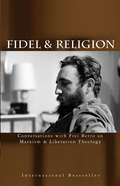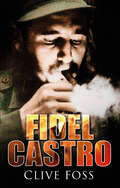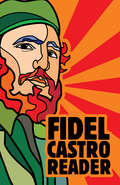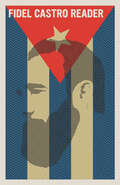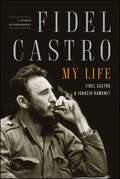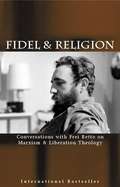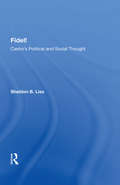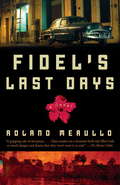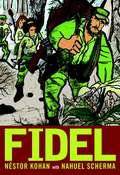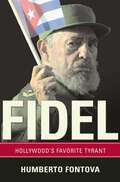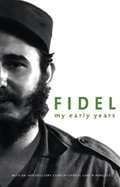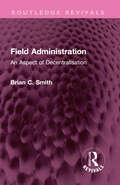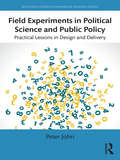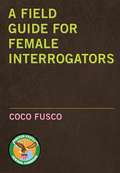- Table View
- List View
Fiascos in Public Policy and Foreign Policy (ISSN)
by Kai Oppermann and Alexander SpencerThe collection brings together scholars from Public Policy and Foreign Policy to address the theme of policy fiascos. So far research on failure and fiascos in both Public Policy and Foreign Policy has existed independent of each other with very little communication between the two sub-disciplines. The contributions aims to bridge this divide and bring the two sides into a dialogue on some of the central issues in the study of fiascos including how to define, identify and measure policy failure (and success); the social and political contestation about what counts as policy fiascos; the causes of policy fiascos and their consequences; the attribution of blame; as well as processes of learning from fiascos. A common theme of the collection will be to explore different epistemological and methodological approaches to studying policy fiascos. The volume appeals to scholars and practitioners interested in policy failures and fiascos both within and among states and other international actors. This book was previously published as a special issue of the Journal of European Public Policy.
Fiber: The Coming Tech Revolution—and Why America Might Miss It
by Susan CrawfordThe world of fiber optic connections reaching neighborhoods, homes, and businesses will represent as great a change from what came before as the advent of electricity. The virtually unlimited amounts of data we’ll be able to send and receive through fiber optic connections will enable a degree of virtual presence that will radically transform health care, education, urban administration and services, agriculture, retail sales, and offices. Yet all of those transformations will pale compared with the innovations and new industries that we can’t even imagine today. In a fascinating account combining policy expertise and compelling on-the-ground reporting, Susan Crawford reveals how the giant corporations that control cable and internet access in the United States use their tremendous lobbying power to tilt the playing field against competition, holding back the infrastructure improvements necessary for the country to move forward. And she shows how a few cities and towns are fighting monopoly power to bring the next technological revolution to their communities.
Fiction & the Colonial Experience (Routledge Revivals)
by Jeffrey MeyersBritish colonialism provided a rich vein of material for the novelists of the first half of the 20th century. This study, originally published in 1968, looks at five writers and their reaction to the Empire: Rudyard Kipling, E. M. Forster, Joseph Conrad, Joyce Cary and Graham Greene. It shows how the romantic adventure stories of Kipling’s early days, in which the indigenous population plays almost no part, gave rise to the much more important novels of spiritual and moral conflict in which the stereotyped values of Empire are questioned. The decline of colonialism from its apogee in the 1880s within a relatively short period makes the novels discussed a compact group, so that not only is the use of colonial material closely studied, but its impact on the novelists themselves emerges clearly. This is an important study of a major literary theme, linking modern literature and modern history at a vital point.
Fictional International Relations: Gender, Pain and Truth (War, Politics and Experience)
by Sungju Park-KangThis book proposes the idea of fictional International Relations (IR) and engages with feminist IR by contextualising the case of a woman spy in Korea in the Cold War. Fictional imagination and feminist IR encourage one to go beyond conventional or standard ways of thinking; it reshapes taken-for-granted interpretations and assumptions. This takes the view that a dominant narrative of events might be reconstructed as a different kind of story, once events are placed within a wider temporal approach. The case of the woman Korean secret agent- who reportedly bombed a South Korean plane (Korean Airlines (KAL) Flight 858) under the instruction from the North Korean leadership to disrupt the Seoul Olympic Games- is chosen to serve as an effective example of fictional IR and feminist IR scholarship, which can be investigated through the research puzzles concerning gender, pain and truth. Fictional International Relations has three main objectives. First, it investigates the way in which fiction-writing can become a method for dealing with data problems and contingency in IR. Second, the book examines how gender, pain and truth operate or interact in the case of the Korean spy and how this observation can strengthen feminist IR in terms of intersectionality. Finally, the author goes on to explore why this case has been so difficult to study openly and thoroughly. The aim of the book is not to refute the official findings; the point is to unpack complex dynamics surrounding truth—more specifically how the official account has been executed as ‘the’ truth—based on a feminist-informed investigation. This book will be of interest to students of IR theory, critical security studies, Cold War studies, gender studies and Asian studies.
Fictional Worlds and the Political Imagination
by Garry L. HagbergThere has been a steady stream of articles written on the relations between political thought and the interpretation of literature, but there remains a need for a book that both introduces and significantly contributes to the field – particularly one that shows in detail how we can think more freely and creatively about political possibilities by reading and reflecting on politically significant literature. This volume offers analytically acute and culturally rich ways of understanding how it is that we can productively think philosophically about political literature and what kind of distinctive conceptual progress we can make by doing so. Given the extremely widespread interest in political issues, this volume will strike resonant chords far and wide, while offering something that has not been done quite in this way and for which the time certainly seems right.
Fictions of Dignity: Embodying Human Rights in World Literature
by Elizabeth S. AnkerOver the past fifty years, debates about human rights have assumed an increasingly prominent place in postcolonial literature and theory. Writers from Salman Rushdie to Nawal El Saadawi have used the novel to explore both the possibilities and challenges of enacting and protecting human rights, particularly in the Global South. In Fictions of Dignity, Elizabeth S. Anker shows how the dual enabling fictions of human dignity and bodily integrity contribute to an anxiety about the body that helps to explain many of the contemporary and historical failures of human rights, revealing why and how lives are excluded from human rights protections along the lines of race, gender, class, disability, and species membership. In the process, Anker examines the vital work performed by a particular kind of narrative imagination in fostering respect for human rights. Drawing on phenomenology, Anker suggests how an embodied politics of reading might restore a vital fleshiness to the overly abstract, decorporealized subject of liberal rights.Each of the novels Anker examines approaches human rights in terms of limits and paradoxes. Rushdie's Midnight's Children addresses the obstacles to incorporating rights into a formerly colonized nation's legal culture. El Saadawi's Woman at Point Zero takes up controversies over women's freedoms in Islamic society. In Disgrace, J. M. Coetzee considers the disappointments of post-apartheid reconciliation in South Africa. And in The God of Small Things, Arundhati Roy confronts an array of human rights abuses widespread in contemporary India. Each of these literary case studies further demonstrates the relevance of embodiment to both comprehending and redressing the failures of human rights, even while those narratives refuse simplistic ideals or solutions.
Fictitious Capital: How Finance Is Appropriating Our Future
by David Broder Cédric DurandHow finance is a mechanism of social and political dominationThe 2007–08 credit crisis and the long recession that followed brutally exposed the economic and social costs of financialization. Understanding what lay behind these events, the rise of “fictitious capital” and its opaque logic, is crucial to grasping the social and political conditions under which we live. Yet, for most people, the operations of the financial system remain shrouded in mystery.In this lucid and compelling book, economist Cédric Durand offers a concise and critical introduction to the world of finance, unveiling the truth behind the credit crunch. Fictitious Capital moves beyond moralizing tales about greedy bankers, short-sighted experts and compromised regulators to look at the big picture. Using comparative data covering the last four decades, Durand examines the relationship between trends such as the rise in private and public debt and the proliferation of financial products; norms such as our habitual assumptions about the production of value and financial stability; and the relationship of all this to political power.Fictitious Capital offers a stark warning about the direction that the international economy is taking. Durand argues that the accelerated expansion of financial operations is a sign of the declining power of the economies of the Global North. The City, Wall Street and other centres of the power of money, he suggests, may already be caked with the frosts of winter.
Fidel & Gabo
by Ángel Esteban Stéphanie PanichelliThe story of the controversial friendship between Nobel prize-winning author Gabriel Gabriel García Márquez and Fidel Castro In Fidel and Gabo, Márquez scholars Ángel Esteban and Stéphanie Panichelli examine this strange, intimate, and incredibly controversial friendship between the beloved author and Cuban dictator, exposing facets of their personalities never before revealed to the greater public. For years, Márquez, long fascinated with power, solicited and flattered Castro in hopes of a personal audience, for he viewed Castro's Cuba as the model on which Latin American would one day build its own brand of socialism. Fidel and Gabo is a vivid and in-depth look at two of the most influential men of the modern era, their worlds, and the effect this friendship has had on their life and works.
Fidel & Gabo: A Portrait of the Legendary Friendship Between Fidel Castro and Gabriel Garcia Marquez
by Angel Esteban Stephanie Panichelli<P> An exposé of the controversial friendship between Nobel-prize winning author Gabriel Garcia Marquez and Fidel Castro. <P> Few contemporary writers are more revered by Americans than Gabriel Garcia Marquez, the Nobel prize-winning author of Love in the Time of Cholera and One Hundred Years of Solitude. And few political leaders are more reviled than Fidel Castro. Yet these two seemingly disparate men are close friends. What could possibly unite these two men in friendship? <P> In Fidel and Gabo, Márquez scholars Ángel Esteban and Stéphanie Panichelli examine this strange, intimate, and incredibly controversial friendship between the beloved author and Cuban dictator, exposing facets of their personalities never before revealed to the greater public. For years, Márquez, long fascinated with power, solicited and flattered Castro in hopes of a personal audience, for he viewed Castro’s Cuba as the model on which Latin American would one day build its own brand of socialism. Upon their first meeting, Castro quickly came to regard Márquez as a genius and still calls him his closest friend and confidant. To this day, Márquez still gives Castro “first look” at all his manuscripts and craves his approval. <P> Fidel and Gabo is a vivid and in-depth look at two of the most influential men of the modern era, their worlds, and the effect this friendship has had on their life and works.
Fidel & Religion: Conversations with Frei Betto on Marxism & Liberation Theology
by Fidel Castro Frei Betto Armando HartA bestseller that offers an intimate insight into Fidel Castro, the man behind the beard! · This historic encounter between religion and revolution paved the way for Pope John Paul II's historic visit to Cuba in 1999 and the rule change in the Cuban Communist Party (1992) accepting as members those practicing their religious faith ·
Fidel Castro
by Clive FossFidel Castro is a dynamic and charismatic leader, who has led Cuba through success and failures since 1959. Son of a rich landowner, he became a radical revolutionary who attempted to overthrow the government in 1956 with a tiny band of followers. Using propaganda and subversion as much as sudden attacks from his mountain hideout, he gained victory in 1959. He liberated his country from one dictator and the overwhelming influence of the United States, only to turn it into another dictatorship firmly under the control and patronage of the Soviet Union. The failure of the American attack at the Bay of Pigs in 1961 added to his reputation, while the missile crisis of 1962 put Cuba right at the centre of the Cold War. Later, by sending his army to Africa and supporting guerrilla movements in Latin America, he made Cuba a signficant player on the world stage. Despite many attempts to remove him and the economic collapse of the USSR, Castro survived and in 1999, celebrated 40 years of his regime.
Fidel Castro Reader
by Fidel Castro David DeutschmannAn outstanding new anthology of one of history's greatest oratorsHere, at last, is a comprehensive anthology presenting the voice of one of history's greatest orators, Fidel Castro. Love him or hate him, there is no denying he is a "master of the spoken word," as Gabriel García Márquez has described him.Emerging in the 1960s as a leading voice in support of Third World anticolonial struggles and continuing to play a role in the antiglobalization movement of today, Fidel Castro remains an articulate and penetrating--if controversial--political thinker and leader, who has outlasted ten hostile US presidents.His direct, forthright approach, his incredible grasp of diverse economic, historical, and cultural topics, and his idealism stand in stark contrast against the spin and superficiality of most political leaders.Covering five decades of Fidel's speeches, this selection begins with his famous courtroom defense ("History will Absolve Me"), and also includes his speech on learning of Che Guevara's death in Bolivia, his analysis of the collapse of the Soviet Union, and his response to the 9/11 terrorist attacks. With his declining health and the emergence of new leaders such as Hugo Chávez in Venezuela and Evo Morales in Bolivia, this book sheds light not just on Castro's mighty role in Latin America's immediate past, but also on his legacy for the future.The Fidel Castro Reader includes a chronology of the Cuban Revolution, an extensive glossary and index as well as 24 pages of photos. As the first anthology of Castro's speeches to be published in English since the 1960s, this is an essential resource for both scholars and general readers. "Fidel's devotion to the word is almost magical." -- Gabriel García Márquez "Fidel is the leader of one of the smallest countries in the world, but he has helped to shape the destinies of millions of people across the globe."--Angela Davis "Fidel Castro is a man of the masses... The Cuban revolution has been a source of inspiration to all freedom-loving people."--Nelson Mandela "Fidel's is a singing and dancing intellect."--Alice Walker "The editors] have done an admirable, even heroic, job of editing and excerpting this reader [which] serves a purpose for both historians and politicos." --Foreword magazine
Fidel Castro Reader
by Fidel CastroA comprehensive anthology with more than 30 speeches that span five decades by Fidel Castro, one of history&’s greatest orators.Emerging in the 1960s as a leading voice in support of anticolonial struggles, then continuing to play a role in the antiglobalization movement in the subsequent decades, Fidel Castro was an articulate and penetrating—if controversial—political thinker and leader, who outlasted ten US presidents.Covering five decades of Fidel&’s speeches, this selection begins with his famous courtroom defense (&“History will Absolve Me&”), and also includes his speech on learning of Che Guevara&’s death in Bolivia, his analysis of the collapse of the Soviet Union, and his response to the 9/11 terrorist attacks. With his declining health and the emergence of new leaders such as Hugo Chávez in Venezuela and Evo Morales in Bolivia, this book sheds light not just on Castro&’s mighty role in Latin America&’s past, but also on his legacy for the future. Love him or hate him, this anthology demonstrates that Fidel Castro is a &“master of the spoken word,&” as Gabriel García Márquez has described him.The Fidel Castro Reader includes a chronology of the Cuban Revolution, an extensive glossary and index as well as 24 pages of photos.
Fidel Castro: A Spoken Autobiography
by Fidel Castro Ignacio Ramonet Andrew HurleyFidel Castro is perhaps the most charismatic and controversial head of state in modern times. A dictatorial pariah to some, he has become a hero and inspiration for many of the world's poor, defiantly charting an independent and revolutionary path for Cuba over nearly half a century. Numerous attempts have been made to get Castro to tell his own story. But only now, in the twilight of his years, has he been prepared to set out the details of his remarkable biography for the world to read. This book is nothing less than his living testament. As he told reporters, his desire to finish checking its text was the one thing that kept him going through his recent illness. He presented a copy of the book in its Spanish edition to his compadre President Hugo Chávez of Venezuela. In these pages, Castro narrates a compelling chronicle that spans the harshness of his elementary school teachers; the early failures of the revolution; his intense comradeship with Che Guevara and their astonishing, against-all-odds victory over the dictator Batista; the Cuban perspective on the Bay of Pigs and the ensuing missile crisis; the active role of Cuba in African independence movements (especially its large military involvement in fighting apartheid South Africa in Angola); his relations with prominent public figures such as Boris Yeltsin, Pope John Paul II, and Saddam Hussein; and his dealings with no less than ten successive American presidents, from Eisenhower to George W. Bush. Castro talks proudly of increasing life expectancy in Cuba (now longer than in the United States); of the half million students in Cuban universities; and of the training of seventy thousand Cuban doctors nearly half of whom work abroad, assisting the poor in Africa, Asia, and Latin America. He is confronted with a number of thorny issues, including democracy and human rights, discrimination toward homosexuals, and the continuing presence of the death penalty on Cuban statute books. Along the way he shares intimacies about more personal matters: the benevolent strictness of his father, his successful attempt to give up cigars, his love of Ernest Hemingway's novels, and his calculation that by not shaving he saves up to ten working days each year. Drawing on more than one hundred hours of interviews with Ignacio Ramonet, a knowledgeable and trusted interlocutor, this spoken autobiography will stand as the definitive record of an extraordinary life lived in turbulent times.
Fidel Castro: A Spoken Autobiography
by Fidel Castro Ignacio RamonetFidel Castro is perhaps the most charismatic and controversial head of state in modern times. A dictatorial pariah to some, he has become a hero and inspiration for many of the world's poor, defiantly charting an independent and revolutionary path for Cuba over nearly half a century. Numerous attempts have been made to get Castro to tell his own story. But only now, in the twilight of his years, has he been prepared to set out the details of his remarkable biography for the world to read. This book is nothing less than his living testament. As he told reporters, his desire to finish checking its text was the one thing that kept him going through his recent illness. He presented a copy of the book in its Spanish edition to his compadre President Hugo Chávez of Venezuela. In these pages, Castro narrates a compelling chronicle that spans the harshness of his elementary school teachers; the early failures of the revolution; his intense comradeship with Che Guevara and their astonishing, against-all-odds victory over the dictator Batista; the Cuban perspective on the Bay of Pigs and the ensuing missile crisis; the active role of Cuba in African independence movements (especially its large military involvement in fighting apartheid South Africa in Angola); his relations with prominent public figures such as Boris Yeltsin, Pope John Paul II, and Saddam Hussein; and his dealings with no less than ten successive American presidents, from Eisenhower to George W. Bush. Castro talks proudly of increasing life expectancy in Cuba (now longer than in the United States); of the half million students in Cuban universities; and of the training of seventy thousand Cuban doctors nearly half of whom work abroad, assisting the poor in Africa, Asia, and Latin America. He is confronted with a number of thorny issues, including democracy and human rights, discrimination toward homosexuals, and the continuing presence of the death penalty on Cuban statute books. Along the way he shares intimacies about more personal matters: the benevolent strictness of his father, his successful attempt to give up cigars, his love of Ernest Hemingway's novels, and his calculation that by not shaving he saves up to ten working days each year. Drawing on more than one hundred hours of interviews with Ignacio Ramonet, a knowledgeable and trusted interlocutor, this spoken autobiography will stand as the definitive record of an extraordinary life lived in turbulent times.
Fidel and Religion: Fidel Castro in Conversation with Frei Betto on Marxism and Liberation Theology
by Fidel Castro Frei BettoIn an intimate 23-hour dialogue with Brazilian liberation theologist Frei Betto, Fidel Castro revealed much about his personal background and candidly discussed his views on religion.
Fidel!: Castro's Political And Social Thought
by Sheldon B. LissThe author of this book takes a highly original approach to understanding the past three decades of Cuban history–he offers an analysis and interpretation of the prolific writings and speeches of Fidel Castro and of numerous interviews with him. Through Castro’s own words, Sheldon Liss examines the evolution of the Cuban leader’s political and soci
Fidel's Last Days
by Roland MerulloRoland Merullo has consistently wowed critics with his brilliant storytelling and his refusal to be pigeonholed, hopscotching from the coming-of-age tale (In Revere, In Those Days) to the novel-as-fable (Golfing with God) to the road trip genre (Breakfast with Buddha). Now Merullo delivers a dazzling and finely nuanced political thriller about a clandestine plot to assassinate Cuban dictator Fidel Castro. Former CIA agent Carolina Perez has spent five years working deep undercover with a singular goal: to take down Castro and free Cuba from his troubled presence. Recruited by a powerful shadow organization known as the White Orchid, steely and sexy Carolina has passed test after test to prove herself ready for the ultimate assignment. Convinced of the rightness of her cause, she will do anything to complete her mission. That includes duping her uncle Roberto Anzar, a wealthy and influential player in Miami's Cuban American community. But when suspicious details raise questions about her mysterious employer, not even Carolina is prepared for the elaborate web of deceit that surrounds her. Across the Straits of Florida, Carlos Gutierrez has been lured into playing a pivotal role in the plot to overthrow el Comandante. The minister of health and a member of Castro's inner circle, Carlos has grown disenchanted with a political system that pays lip service to the Revolution's egalitarian ideals while ruling the country with ruthlessness, corruption, and lies. As his involvement deepens at great risk to himself and those he loves, the doctor who has dedicated his career to saving lives must decide how much blood he is willing to have on his own hands in the name of freedom. For both Carlos and Carolina, the threat of betrayal looms large. Who can be trusted in a byzantine network of spies, double agents, and informants? Is the plot real or is it an elaborate ruse to expose the underground dissidents in Cuba? From the sizzling opulence of Miami to the paranoid dreamscape of Havana,Fidel's Last Daysis a dizzying ride by a novelist whose genre-crossing talents know no bounds. From the Hardcover edition.
Fidel: An Illustrated Biography of Fidel Castro
by Nahuel Scherma Nestor Kohan Elise Buchman Miracle JonesIn the United States, ninety miles from Cuban shores, tempers flare on the subject of Fidel Castro: some say he is a liberator, some say a dictator. In Fidel, Nestor Kohan and Nahuel Scherma present one of the towering figures of the twentieth-century as he is seen by Latin Americans: as the leader who, for over fifty years, has stood up to the greatest military power in the world, and remained standing.Here, in Kohan's incisive prose and Scherma's passionate illustrations, is the man who, inspired by decades of Latin American Marxist thinking, fought from the mountains of the Sierra Maestra to free his country--the man who walked the razor's edge between military threats by the United States and political coercion by the Soviet Union--the man who became a leader in the revolution against colonial governments from Angola to Vietnam to Latin America--the man who fought, above all, to transform the conscience of his people, spreading literacy, culture, and free medical care to everyone on the island. Here is Fidel--the man who became the symbol of the revolution in the New World.
Fidel: Hollywood's Favorite Tyrant
by Humberto Fontova"Cuba's own Elvis"--that's what Dan Rather calls him. Funny name for a man who has threatened the United States with nuclear war, who has made common cause with Islamic terrorists against the United States, and whose people risk death to escape him. But there's a lot that Hollywood liberals and other Fidel Castro admirers would rather you didn't know about the dictator of Cuba--like how he imprisoned more people as a percentage of population than Hitler or Stalin; how Fidel's firing squads killed thousands of Cubans; how Fidel's subjects would rather inject themselves with AIDS than live under his tyranny.Drawing on a wealth of research--including interviews with former Castro regime officials, anti-Castro freedom fighters, and Castro's political prisoners--acclaimed author Humberto Fontova reveals the ugly face of the Castro regime. Along the way, he punctures some of the egregious myths about Cuba: The Motorcycle Bore: The real Che Guevara--not the rebel rock star of T-shirt fame, but a battlefield incompetent, a puritan-Stalinist bore, and the man who sent thousands of innocent Cubans to the firing squadsCommunist Economics 101: How Castro took Cuba from being a First World economy that had to turn away European emigrants to a country that even impoverished Haitians won't emigrate to, with among the highest suicide and abortion rates in the worldThe Saddam Hussein Next Door: How Castro has not only had nuclear weapons (and wanted to launch them) but has plotted massive terrorist outrages against the United StatesFidel the anti-black racist and unrepentant Communist--and his long list of useful idiots: from Jesse Jackson to Oliver Stone, George McGovern to Ted Turner, Bill Clinton to Steven Spielberg, to Katie Couric and many othersThe Left's favorite racism: against conservative Cuban-Americans Fidel: Hollywood's Favorite Tyrant is a stunning exposé of the real Fidel Castro and of the hypocrisy, ignorance, and inexcusable appeasement that makes his liberal admirers notorious.
Fidel: My Early Years
by Fidel CastroExcerpting conversations between Cuban President Fidel Castro and Brazilian priest Frei Bretto, this work contains Castro's own account of his childhood and youth. It also contains a 1995 speech by Castro at the U. of Havana in which he reflects on his days as student organizer and Colombian journalist Arturo Alape about the April 1948 popular uprising in Colombia, which Castro witnessed. New to this edition are excerpts from Castro's prison letters shortly after the failed attack on the Moncada barricades in 1953.
Fidel’s Last Days
by Roland MerulloRoland Merullo has consistently wowed critics with his brilliant storytelling and his refusal to be pigeonholed, hopscotching from the coming-of-age tale (In Revere, In Those Days) to the novel-as-fable (Golfing with God) to the road trip genre (Breakfast with Buddha). Now Merullo delivers a dazzling and finely nuanced political thriller about a clandestine plot to assassinate Cuban dictator Fidel Castro. Former CIA agent Carolina Perez has spent five years working deep undercover with a singular goal: to take down Castro and free Cuba from his troubled presence. Recruited by a powerful shadow organization known as the White Orchid, steely and sexy Carolina has passed test after test to prove herself ready for the ultimate assignment. Convinced of the rightness of her cause, she will do anything to complete her mission. That includes duping her uncle Roberto Anzar, a wealthy and influential player in Miami’s Cuban American community. But when suspicious details raise questions about her mysterious employer, not even Carolina is prepared for the elaborate web of deceit that surrounds her. Across the Straits of Florida, Carlos Gutierrez has been lured into playing a pivotal role in the plot to overthrow el Comandante. The minister of health and a member of Castro’s inner circle, Carlos has grown disenchanted with a political system that pays lip service to the Revolution’s egalitarian ideals while ruling the country with ruthlessness, corruption, and lies. As his involvement deepens at great risk to himself and those he loves, the doctor who has dedicated his career to saving lives must decide how much blood he is willing to have on his own hands in the name of freedom. For both Carlos and Carolina, the threat of betrayal looms large. Who can be trusted in a byzantine network of spies, double agents, and informants? Is the plot real or is it an elaborate ruse to expose the underground dissidents in Cuba? From the sizzling opulence of Miami to the paranoid dreamscape of Havana, Fidel’s Last Days is a dizzying ride by a novelist whose genre-crossing talents know no bounds.
Field Administration: An Aspect of Decentralisation (Routledge Revivals)
by Brian C. SmithFirst published in 1967, Field Administration provides a useful introduction to a much-neglected aspect of administration. Every government finds it necessary to decentralise its administration. But in Britain much more attention has been paid to devolution, i.e., to local government, than to deconcentration, i.e., to local and regional administrative organisation, or what Mr. Smith calls field administration. Neither aspect of decentralisation can be fully understood in isolation and one great merit of this volume is it study of interrelationships between the two. To illustrate the general principles involved, case studies are provided of three kinds of field administration: the functional (the Ministry of Agriculture in the U.K.), the integrated prefectoral system (Burma) and the unintegrated prefectoral system (Northern Nigeria). This book will be of interest to students of political science, government and administration.
Field Experiments in Political Science and Public Policy: Practical Lessons in Design and Delivery
by Peter JohnField experiments -- randomized controlled trials -- have become ever more popular in political science, as well as in other disciplines, such as economics, social policy and development. Policy-makers have also increasingly used randomization to evaluate public policies, designing trials of tax reminders, welfare policies and international aid programs to name just a few of the interventions tested in this way. Field experiments have become successful because they assess causal claims in ways that other methods of evaluation find hard to emulate.Social scientists and evaluators have rediscovered how to design and analyze field experiments, but they have paid much less attention to the challenges of organizing and managing them. Field experiments pose unique challenges and opportunities?for the researcher and evaluator which come from working in the field. The research experience can be challenging and at times hard to predict. This book aims to help researchers and evaluators plan and manage their field experiments so they can avoid common pitfalls. It is also intended to open up discussion about the context and backdrop to trials so that these practical aspects of field experiments are better understood.The book sets out ten steps researchers can use to plan their field experiments, then nine threats to watch out for when they implement them. There are cases studies of voting and political participation, elites, welfare and employment, nudging citizens, and developing countries.
Field Guide for Female Interrogators, A
by Coco FuscoThe world was shocked by the images that emerged from Abu Ghraib, the US-controlled prison in Iraq. Lynndie England, the young female army officer shown smiling devilishly as she humiliated male prisoners, became first a scapegoat and then a victim who was "just following orders." Ignored were the more elemental questions of how women are functioning within conservative power structures of government and the military. Why do the military and the CIA use female sexuality as an interrogation tactic, and why is this tactic downplayed and even ignored in internal investigations of prisoner abuse?Combining an art project with critical commentary, Coco Fusco imaginatively addresses the role of women in the war on terror and explores how female sexuality is being used as a weapon against suspected Islamic terrorists. Using details drawn from actual accounts of detainee treatment in US military prisons, Fusco conceives a field guide of instructional drawings that prompts urgent questions regarding the moral dilemma of torture in general and the use of female sexuality specifically. Fusco assesses what these matters suggest about how the military and the state use sex, sexuality, and originally feminist notions of sexual freedom.
